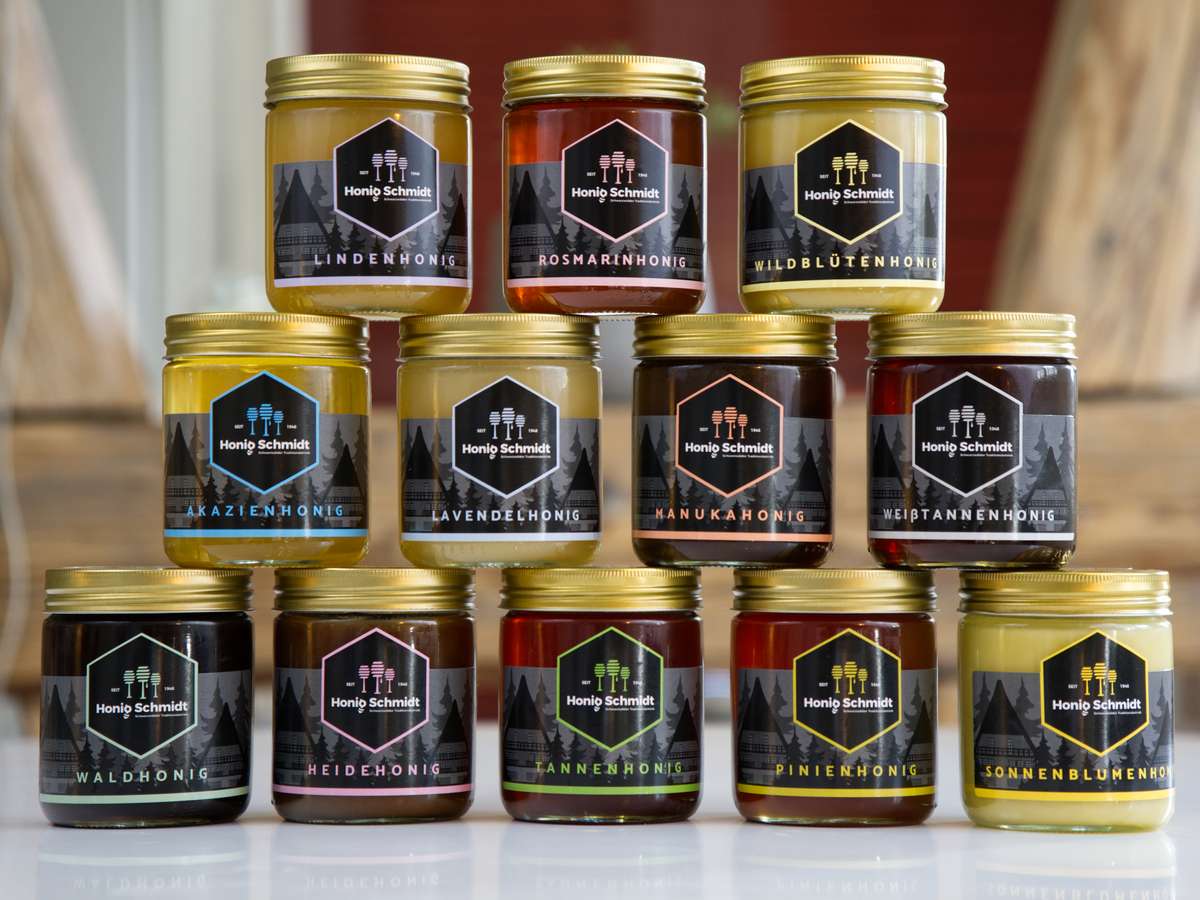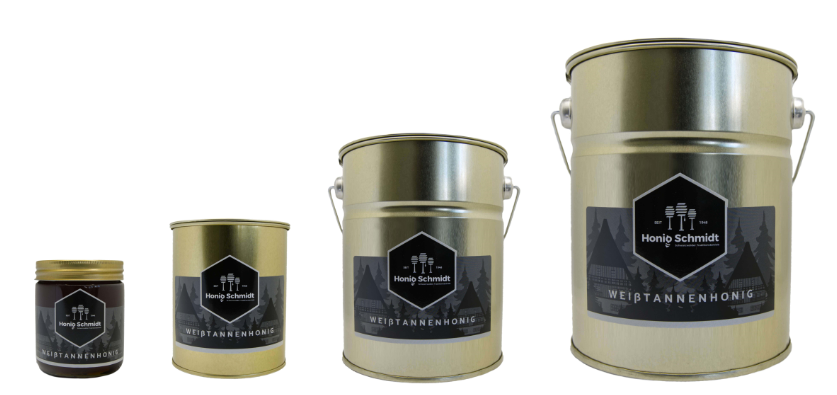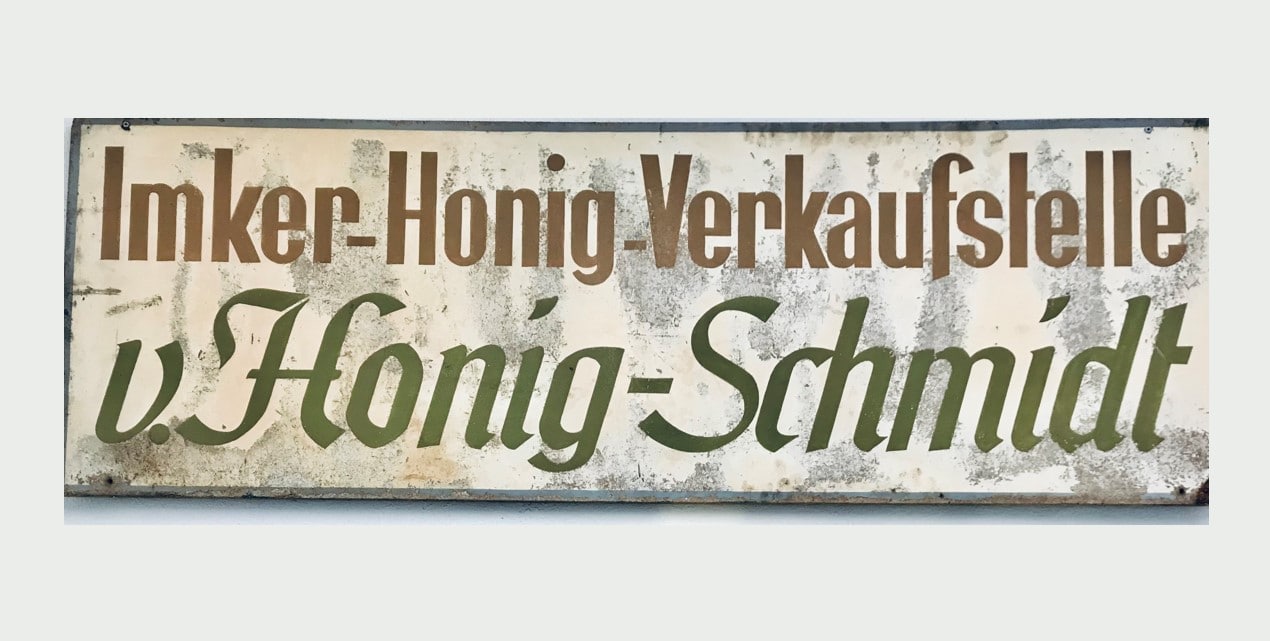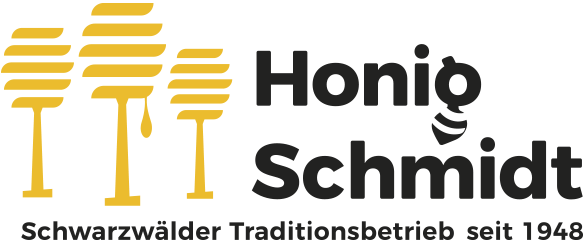Healthy honey, not spoiled - why the honey from our honey factory is so good
Did you know that seven times as much honey is consumed worldwide as is produced? How is that even possible? And did you know that 40% of the world's honey comes from so-called "honey factories" in China and that you can also find it in many honeys on supermarket shelves without you being able to tell?
We would like to give you some tips on what to look out for when buying honey and what advantages our Black Forest honey from our honey factory has over conventional supermarket products.
Varietal purity
Our honey is pure, natural honey throughout. This is not industrially processed and all the valuable vital substances in honey are retained during processing. In principle, bees only fly to one type of plant during a collective flight. Nevertheless, it is impossible that 100% of honey contains only the ingredients of this type of plant, since never all bees in a bee colony only approach one type of plant. Beekeepers always place their bee colonies near the plants whose honey they want to produce. So far so good.
However, honey does not have to be single-variety, and single-variety honey can even be sold even though it has been mixed from different honeys. The labeling of the origin of honey is regulated in the Honey Ordinance. According to this, the exact country of origin must be specified for single-variety honeys. This looks different with honey mixes.
One of the following information can be given instead on honey mixtures from more than one country of origin:
"Mixture of honey from EU and non-EU countries"
Well, then you already know that honey doesn't come from Mars. However, there is still a great risk that such honey mixtures contain some honey from China. After all, China's global market share is around 40%. And this is highly problematic, because honey products from China are often made under questionable conditions. In so-called “bee factories”, animals are tortured and killed, while honey is processed using ultra-high temperature and ultra-fine filtration, and then even added other additives to stretch it. This can actually no longer be called honey, because these products no longer contain any ingredients that are valuable for humans.
As a customer, you will learn neither the individual countries of origin nor the proportion of the individual honeys in the honey mixture. This indication of origin is therefore not very meaningful. The manufacturer can provide you with additional information on the origin of the honey, but is not obliged to do so. As a customer, you practically do not find out whether your honey then contains parts of honey, e.g. from China. Often residues of chemical pesticides and antibiotics were found in these honeys, which have long been banned in the EU, but still find their way into the honey in this way.
Our tip: Avoid such mixed honeys if possible to make absolutely sure that they do not contain any stretched honey that has been produced under questionable conditions. You can be sure of our honeys!

Our honeys do not come from honey factories, but from beekeepers, some of whom we have been working with for generations.
No filtration
After the honey harvest, the honey has to be processed further. Many industrial honeys are heated up strongly and filtered extremely finely. This makes processing easier, but in this way all inorganic and organic substances are removed from the honey. Although it is easier to process for the food industry, such honeys are of inferior quality, almost a pure sugar product. And dead food on top of that.
The valuable pollen is also removed during the filtering process. Have you ever wondered why many honeys from the supermarket do not crystallize at all? Every natural honey crystallizes at some point - sooner or later, depending on the type. Here, the sugar molecules attach themselves to the ingredients in honey, such as pollen. If these ingredients are not present, the honey does not crystallize.
We don't do this. Our honeys are sifted and scooped by hand in our honey factory and not filtered. During processing, we also give the honey time to rest before we finally fill it into honey jars or golden honey buckets. A natural "foam" forms on the surface, which we also skim off by hand so that our customers receive a perfect product. Sieving the honey is part of normal, careful honey processing. Due to the mesh size, all valuable ingredients of the honey are preserved.
No heating
As is so often the case in industrial production, honey is also about the factor of time and coordinated, efficient industrial processes. With honey, however, this is fatal and the principle applies: "Good things take time".
In the case of inferior industrial honey, the honey is strongly heated for processing. This liquefies it and the food industry can then quickly fill this product into different container sizes. However, there are only disadvantages for the consumer, because the strong heating destroys almost all natural ingredients such as enzymes, vitamins, minerals or amino acids. What remains is a sugar compound. The industry then tries to add these substances artificially. BUT: Only natural honey contains all the ingredients that only nature or only bees can produce in a balanced way.
We too warm honey when we bottle it for our customers. But we don't heat it. This means that we slowly warm it up to a maximum temperature that protects all ingredients and allows them to persist. This process takes and is even longer if we let the honey rest before bottling. The industry doesn't have time for that - we'll take it!
Handwork
Our honey specialties are produced in real manufacturing. By hand and by us personally. It doesn't matter whether we fill and process the honey, whether we scoop it into the honey jar by hand or apply the labels. We do it personally, with a lot of commitment and love for the bee product. It is important to us that our customers know that at Honig Schmidt, from the first production step to the dispatch of the honey, there are people who produce premium honeys of the highest quality by hand with the greatest care.
We love our work in our honey factory and with the honey.

We carefully process our honeys by hand!
Packaging honey in jars or metal buckets
Our honeys are available in beautiful honey jars of 500g or in golden honey pails of 1kg, 2.5kg or 4.7 kg. These are all packaging that you can continue to use, i.e. use several times.
In the supermarket you can sometimes find honey in practical dosing aids. But these are made of plastic. On the one hand, plastic can release questionable substances into the honey and also influence or falsify the taste. On the other hand, plastic waste is a global problem and plastic products should be avoided.
Honey from our honey jars or buckets is harmless. The packaging does not react with the honey and is tasteless. Therefore, you can only taste the pure, high-quality honey.
The golden honey buckets can be washed up and used, for example, as a beautiful tealight holder or plant pot. There are lots of creative ideas.
You can also avoid rubbish by buying honey from us.

Our Black Forest white fir honey is also available in environmentally friendly and beautiful packaging.
Environmental Protection
As a producer of natural honey, environmental protection is very important to us and we are involved in various projects beyond our work. And you do the same with your purchase of a product from Honig Schmidt. From every product we sell, we donate money to environmental projects.
For example, this year, in cooperation with a winemaker in Rheinhessen, we transformed an area that was previously used for agriculture into a bee paradise with many rare wildflowers.
In addition, we try to use packaging material as efficiently and environmentally friendly as possible. For this purpose, we collect cardboard boxes and filling material in local shops in our neighborhood, which would otherwise end up in the garbage. We use these cardboard boxes and the filling material again to ship our honey specialties. Thus we have already been able to save more than 2 tons of shipping material. And the business owners are also happy that we pick up the cardboard boxes from you and they don't have to throw them away.
Family business in the 4th generation
Our honey manufactory is family-owned in the 4th generation. Honey and other bee products such as propolis, bee pollen and royal jelly are standard items in our families' households.
Our co-owner Michael went to the honey factory almost every day during the holidays and helped with the filling. He later supplied customers and shops in the Black Forest.
The experience with honey has been passed on from generation to generation and we continue this work with a passion for honeys and a love of bee products. Here you can find out everything about our company history.

We cherish our old market sign from the 1950s!
Export hit
Our Black Forest honey is a real export hit, far beyond the borders of the Black Forest. We are particularly pleased that we have a large number of customers from the Arab world who appreciate the quality of our Black Forest honey so much. Every day we send our honey all over the world and we are pleased that the fan base for our Black Forest honey continues to grow.
Here are some customer testimonials from all over the world:
Abdullah, Riyadh:
“I have been ordering honey from Honig-Schmidt for several years. The Black Forest honey is fantastic and there is no better honey. I love him."
Majed, Damman:
“The best honey in the world comes from the Black Forest. The Black Forest silver fir honey is simply wonderful and precious. It's worth all the money. In addition, careful packaging and fast delivery. "
Hammad, Jeddah:
"Thank you very much, my friend. The Black Forest honey is unbelievable, a pearl. Your service couldn't be better and I'm already looking forward to the next order."
We look forward to every customer and wish you all the best!


